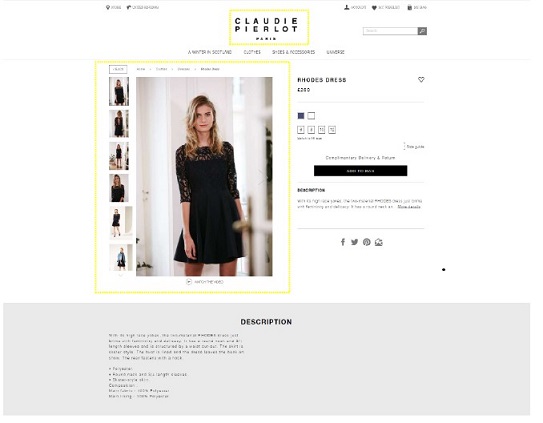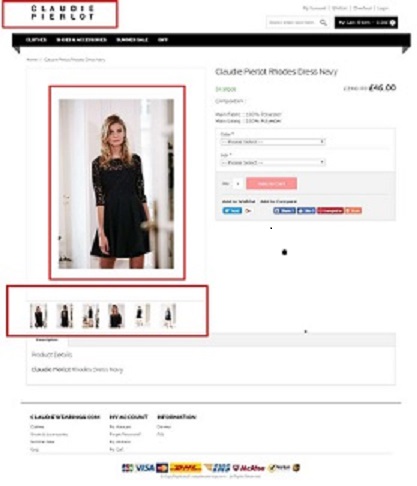
Complainant is Claudie Pierlot of Paris, France, represented by Nameshield, France.
Respondent is Yinglong Ma of Hong Kong, China.
The disputed domain name <claudiewearings.com> is registered with GoDaddy.com, LLC (the “Registrar”).
The Complaint was filed with the WIPO Arbitration and Mediation Center (the “Center”) on October 30, 2018. On October 30, 2018, the Center transmitted by email to the Registrar a request for registrar verification in connection with the disputed domain name. On October 31, 2018, the Registrar transmitted by email to the Center its verification response confirming that Respondent is listed as the registrant and providing the contact details.
The Center verified that the Complaint satisfied the formal requirements of the Uniform Domain Name Dispute Resolution Policy (the “Policy” or “UDRP”), the Rules for Uniform Domain Name Dispute Resolution Policy (the “Rules”), and the WIPO Supplemental Rules for Uniform Domain Name Dispute Resolution Policy (the “Supplemental Rules”).
In accordance with the Rules, paragraphs 2 and 4, the Center formally notified Respondent of the Complaint, and the proceedings commenced on November 2, 2018. In accordance with the Rules, paragraph 5, the due date for Response was November 22, 2018. Respondent did not submit any response. Accordingly, the Center notified Respondent’s default on November 23, 2018.
The Center appointed Lawrence K. Nodine as the sole panelist in this matter on November 28, 2018. The Panel finds that it was properly constituted. The Panel has submitted the Statement of Acceptance and Declaration of Impartiality and Independence, as required by the Center to ensure compliance with the Rules, paragraph 7.
Complainant founded the eponymous fashion design brand CLAUDIA PIERLOT in 1984 and owns international trademark registrations for CLAUDIE PIERLOT (e.g., International Registration No. 528638; registered on November 3, 1988; and International Registration No. 825868, registered on March 9, 2004, based on French registration and designating China, among others). Complainant also owns the domain name <claudiepierlot.com>, which resolves to a website Complainant uses to display and sell its fashions. Below is an image from Complainant’s website:

Respondent registered the disputed domain name <claudiewearings.com> on June 28, 2018. The disputed domain name resolves to a website that appears to sell discounted CLAUDIE PIERLOT fashions. Below is an image from Respondent’s website:

Complainant argues that the disputed domain name <claudiewearings.com> is confusingly similar to its CLAUDIE PIERLOT mark because it incorporates “Claudie”, the first part of Complainant’s mark, and includes the additional term “wearings”, which is a reference to Complainant’s activity. Complainant also maintains that Respondent has no rights or legitimate interests in the disputed domain name because Respondent is not affiliated with Complainant and yet registered the disputed domain name to host a website that copies, without Complainant’s authorization, the look and feel of Complainant’s website, its mark, logos, and images. As to bad faith registration and use, Complainant asserts that considering the content of Respondent’s website Respondent at least had constructive knowledge of Complainant’s rights in the CLAUDIE PIERLOT mark at the time Respondent registered the disputed domain name and that Respondent seeks to benefit commercially by using the disputed domain name to pass itself off as Complainant.
Respondent did not file any response to the Complaint.
The disputed domain name <claudiewearings.com> is confusingly similar to the CLAUDIE PIERLOT mark, in which Complainant has rights. Although the disputed domain name does not include the “Pierlot” component of Complainant’s mark, it is clear from an examination of the associated website that Respondent intends to imitate Complainant, and thereby cause confusion or mistake. The website associated with the disputed domain name <claudiewearings.com> is a copy, only slightly rearranged, of Complainant’s website. Respondent’s webpage displays the entire CLAUDIE PIERLOT mark, not just the “Claudie” element. Respondent copied the photographs of Complainant’s models and purports to offer Complainant’s products for sale. Respondent manifestly intends for Internet viewer’s to believe that the disputed domain name is a shorthand version of Complainant.
While UDRP panels generally disregard website content in assessing confusing similarity under paragraph 4(a)(i) of the Policy, in some instances the panel may take the content of the website associated with the disputed domain name into consideration “to confirm confusing similarity whereby it appears prima facie that the respondent seeks to target a trademark through the disputed domain name”. See WIPO Overview of WIPO Panel Views on Selected UDRP Questions, Third Edition (“WIPO Overview 3.0”), section 1.15. See VF Corporation v. Vogt Debra, WIPO Case No. D2016-2650 (finding <bagpakonline.com> to be confusingly similar to EASTPAK where the associated website displayed the EASTPAK logo and featured EASTPAK products).
The Panel finds that Complainant has satisfied paragraph 4(a)(i) of the Policy.
Respondent lacks rights or legitimate interests in the disputed domain name. There is nothing in the record to suggest that Respondent is using or making preparations to use the disputed domain name in connection with a bona fide offering of goods or services. Respondent uses the disputed domain name to host a website that mimics the look and feel of Complainant’s website and purports to offer (without authority) Complainant’s products at a deep discount. This unauthorized use is not bona fide. See Bottega Veneta SA v. Chen Kai a.k.a. Kai Chen / WhoIs Agent, Domain WhoIs Protection Service, WIPO Case No. D2013-0436(finding that the respondent’s unauthorized use of <borsabottegaveneta.com> and <borsebottegavenetas.com> to host websites imitating the look and feel of complainant’s website and offering the complainant’s bags and clothing “could not be regarded as a bona fide offering of goods or services”). Even if we assume that the offered fashions are genuine1 a reseller does not have the right to copy a manufacturer’s website copyrightable layout and photographs.
Accordingly, Complainant has satisfied paragraph 4(a)(ii) of the Policy.
The evidence of record supports a finding that Respondent registered and used the disputed domain name in bad faith. Respondent’s copying of Complainant’s photographs and layout is proof that that Respondent was aware of Complainant. For the same reason, is highly likely that Respondent was aware of Complainant’s rights in CLAUDIE PIERLOT at the time it registered the disputed domain name. Indeed, when it copied Complainant’s layout, Respondent deleted Complainant’s copyright notice and substituted its own, a deliberate act that evidences Respondent’s awareness of Complainant’s analogous rights.
These facts also support the finding that Respondent is engaged in an intentional attempt to pass itself off as Complainant and to attract Internet users to its website for its own commercial benefit. Respondent, thus, uses the disputed domain name in bad faith.
The Panel finds that Complainant has satisfied paragraph 4(a)(iii) of the Policy.
For the foregoing reasons, in accordance with paragraphs 4(i) of the Policy and 15 of the Rules, the Panel orders that the disputed domain name <claudiewearings.com> be transferred to Complainant.
Lawrence K. Nodine
Sole Panelist
Date: December 12, 2018
1 Complainant does not say whether Respondent’s offered products are genuine and does not allege that are counterfeit. The Panel is annoyed by this. Due diligence in advance of filing a complaint under the Policy would seem to require an investigation to determine whether the goods are legitimate. This could be accomplished by a simple purchase from Respondent’s website. The Panel excuses this deficiency only because the copying of the Complainant’s webpage is by itself sufficient to find that Respondent’s offering is not bona fide.